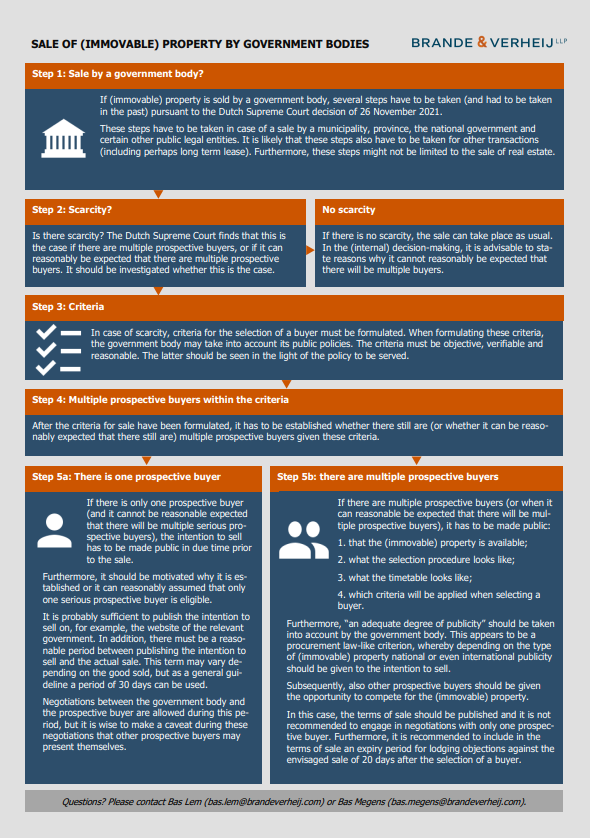On 26 November 2021, in a case which is now known as the ‘Didam supermarket war’, the Dutch Supreme Court gave (new) rules on the sale of real estate by government bodies. This case was prompted by the sale of municipal land in the centre of the Dutch town of Didam to a real estate developer who wanted to build a new supermarket for Coop on that spot. Another real estate developer, a franchisee of Coop’s competitor Albert Heijn, was also interested in purchasing the land. However, the municipality did not provide the latter an opportunity to also make a bid for the land.
Subsequently, this real estate developer initiated summary proceedings in which it, briefly put, claimed that the municipality should be prohibited from selling the land unless a public bid procedure had been followed. These claims were dismissed by the lower courts. However, the Supreme Court ruled otherwise.
Pursuant to the Dutch Civil Code, a government body must observe the written and unwritten rules of public law when exercising its powers under private law. This includes the general principles of good governance (algemene beginselen van behoorlijk bestuur). In this case, the claimant specifically invoked the principle of equality.
According to the Supreme Court, it follows from this principle that a government body selling scarce real estate must give room to prospective buyers to compete for the purchase. In this case, scarcity means that there are multiple prospective buyers (or that it can reasonably be expected that there will be multiple prospective buyers). If that is the case, criteria for the selection of a buyer must be formulated. These criteria must be objective, verifiable and reasonable.
It should then be determined whether there (still) are (or whether it can reasonably be expected that there still are) multiple prospective buyers given these criteria.
If that is not the case, the sale can take place as usual, i.e. without applying the (new) rules of the Supreme Court. Nevertheless, also in that case the intention to sell has to be made public in due time prior to the sale, whereby reasons must be given as to why it is expected that there will be only one prospective buyer within the criteria. The Supreme Court does not provide any rules for the manner in which the intended sale should be published, nor does it provide a guideline for the period between publication of this information and the actual sale. This term and the manner of publication will be case-specific, but generally speaking, publication on the website of the relevant government body and a period of 30 days will probably suffice. In this case, it is in principle possible to enter into negotiations with the prospective buyer, but it would be wise to make a caveat during these negotiations that other prospective buyers may present themselves.
If there are several (expected) prospective buyers within the criteria, a stricter procedure should be followed. In that case, the availability of the property, the selection procedure, the timetable and the criteria to be applied must be published. An “adequate degree of publicity” must be observed in this regard. It appears that the Supreme Court derived this terminology from procurement law. The process described by the Supreme Court also has characteristics of public tenders. Therefore, in these cases it is recommended to keep prospective buyers at a distance and, where possible, to adhere to a procurement law-like system (which would include giving a period of 20 days to object to the intended sale).
It is important that the Supreme Court does not state that these rules are ‘new’. This means that, in principle, these rules also apply to transactions in the past. The Supreme Court judgment concerns real estate, but the rules might also apply to, for example, the sale of other (scarce) goods by government bodies.
The Supreme Court judgment does provide guidance on the consequences of a violation of these rules (both in the past and in the future). In any event, violation of these rules will probably result in an unlawful government act, so that damaged parties can claim compensation. In principle, claims on this basis are subject to a prescription period of 5 years. Violation of these rules may also lead to the voidability (vernietigbaarheid) or even nullity (nietigheid) of transactions. Whether this is the case also depends on whether the rules have been deliberately violated. In that case, in principle a prescription period of 3 years (in the case of voidability) or even much longer (in the case of nullity) applies.
This judgment can therefore have major consequences for (real estate) transactions, both in the past and in the future. This can present both threats and opportunities. To make it clear what the rules for the sale of (immovable) property by government bodies now look like, we have made an overview of these rules and the steps to be followed:

For further questions, please contact Bas Lem of Bas Megens.
